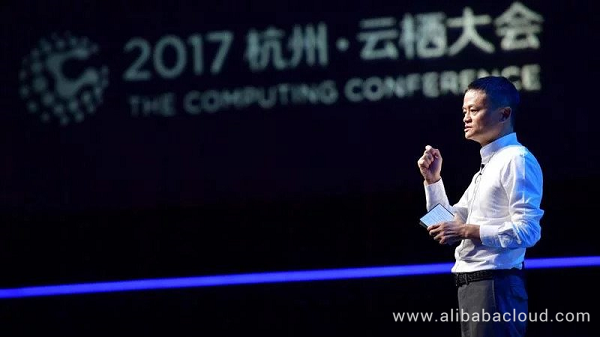Alibaba Cloud is continuing a push out of China into the EMEA market that started around 18 months ago. Alibaba Cloud EMEA General Manager, Yeming Wang, sat down with Computerworld UK to discuss the firm's strategy for disrupting a highly competitive cloud computing market.

The cloud computing division of the $500 billion Chinese technology giant is not that different to its western rivals - Amazon Web Services (AWS), Microsoft Azure and Google Cloud Platform (GCP) - in that it offers a broad range of cloud computing services, from basic infrastructure-as-a-service (IaaS) capabilities like elastic computing, storage and database solutions, to application services and advanced analytics capabilities like machine learning (more on this later).
Alibaba Cloud was launched in 2009 and supports some of the biggest internet companies on the planet – although you probably have never used them directly. Both the ecommerce giant Alibaba and fintech app Ant Financial boast more than 500 million active users.
Alibaba Cloud has seven availability zones in China alone, seven more across Asia Pacific and Hong Kong, two in the US, one in Dubai, and one in Frankfurt for Europe. It also now has local teams in four EMEA locations: the UK, Germany, France and Dubai.
Alibaba Cloud is well poised to disrupt the big three public cloud providers for a few key reasons, EMEA general manager Yeming Wang told Computerworld UK at Alibaba Cloud’s London office opposite the Savoy hotel.
Firstly, the company has access to the enormous Chinese market by providing cloud infrastructure there. But it has also acted as a trusted cloud partner for Chinese companies expanding into Europe through its Frankfurt availability zone.
Complementing all of this is the growing demand for multi-cloud strategies at the enterprise level.
We look at Europe as very strategic and the market is remarkable. We have to be here and at the same time we want to have more innovation here with clients, partners and even research entities and develop this ecosystem.
Wang also pointed to Alibaba's performance capabilities, and in particular the 360,000 transactions per second Alibaba itself processes during 'Singles Day', the equivalent to Black Friday in China.
This is like a stress test and this shows the very strong cloud capability of our elastic [compute], big data and security. Nowhere else can you find such a workload on the cloud. We aren't going to say we are better, but Alibaba is well proven in extreme stress tests.
Naturally the prime advantage Wang and Alibaba see when it comes to bringing its cloud services to customers outside of China is the ability to offer seamless access to a Chinese availability zone.
When we first came to Europe the main drive was to help those Chinese clients come overseas. So we see this is a big advantage for us when we talk about China or Asia. Alibaba Cloud today is the only one that is a real global cloud because even for AWS in Asia, in China, they are like an island, it's quite independent from the rest of the world.
AWS runs two availability zones in the China region, one in Beijing run by Chinese company Sinnet, and one in Ningxia, which is operated by Ningxia Western Cloud Data Technology (NWCD). Chinese law does not allow foreign companies to run cloud computing infrastructure there.
Similarly Microsoft runs its Chinese Azure regions through 21Vianet. Google currently has no plans to run a China region.
Wang is bullish on the idea of modern clients that want to be multi-cloud or even cloud agnostic, providing Alibaba with the opportunity to hoover up a piece of what Gartner forecasts will be a $53 billion IaaS market by next year.
We are talking to our local clients here a lot about a multi-cloud approach. We see they have a clear demand to say we want multi cloud.
He also asserted that adoption of Alibaba should be simple for anyone familiar with popular cloud computing modes of working.
If people are familiar with AWS, they can use Alibaba Cloud. A lot of the user behavior, and even the APIs, are very similar. This delivers a lot of simplicity for developers looking to use Alibaba Cloud.
Wang pointed to some verticals where Alibaba has a unique ability to deliver value, namely retail, media and fintech. Wang clearly separates customers between those seeking general cloud computing, so IaaS, to vertical solutions.
From my point of view I see two different markets. One is for the basic infrastructure. On the other hand I think the real competition will be where you can have a business event instead of this commodity.
For example, Ant Financial is Alibaba's extremely popular fintech app, offering Chinese customers loans, banking, payments, insurance and credit services. So "a full range of fintech technologies, this is also on cloud, so we have this knowhow," he said.
One challenge for Alibaba Cloud is to bring the European market some more tangible case studies than simply bragging about the scale of Alibaba services.
Wang admits as much, saying:
We are also very focused on flagship clients to bring the market something remarkable and we hope that after half a year, or a year, we will have some good news for you.
When it comes to AI and machine learning, which are increasingly key differentiators for vendors in this market, Alibaba takes a slightly different approach to the big three. Under its AI brand ET Brain, Alibaba Cloud offers more vertical-specific applications of AI, including solutions for industrial IoT insights (ET Industrial Brain), smart cities and medicine.
This is a model that more closely resembles IBM Watson than the broader capabilities the likes of Google, Microsoft and AWS offer. That is except for the fact that Watson "seems to be not so successful from an IBM point of view", Wang said.
The good thing for us is from the very beginning with ET Industry Brain we worked with a solar panel program and later on we applied that to another company, so making a standard product.
Alibaba Cloud also has its own version of the popular data science competition site and community Kaggle, which Google acquired last year, called Tianchi. The cloud vendors all clearly see value in owning these data science ecosystems and communities and pushing them to run on their cloud platforms, ideally.
Source: https://www.computerworlduk.com/cloud-computing/how-alibaba-cloud-plans-disrupt-aws-microsoft-google-in-emea-3678283/
We Already Follow the Sun: Alibaba Cloud's Chief Warns Competitors

2,599 posts | 764 followers
FollowAlibaba Clouder - October 23, 2018
Alibaba Clouder - July 3, 2018
Alibaba Clouder - June 29, 2018
Alibaba Clouder - July 5, 2018
Iain Ferguson - April 4, 2022
Iain Ferguson - May 9, 2022

2,599 posts | 764 followers
Follow CloudBox
CloudBox
Fully managed, locally deployed Alibaba Cloud infrastructure and services with consistent user experience and management APIs with Alibaba Cloud public cloud.
Learn More Hybrid Cloud Solution
Hybrid Cloud Solution
Highly reliable and secure deployment solutions for enterprises to fully experience the unique benefits of the hybrid cloud
Learn More Local Public Cloud Solution
Local Public Cloud Solution
This solution helps Internet Data Center (IDC) operators and telecommunication operators build a local public cloud from scratch.
Learn MoreMore Posts by Alibaba Clouder
Raja_KT March 16, 2019 at 3:54 am
Chinese products inroad into Europe and Middle east are already deep-rootedly ingrained and ubiquitous. Alibaba Cloud just need to cement with technologies, Consulting and services.